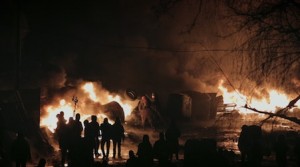Conversation on the filmmaker v. journalist distinction that happened at Sundance was also picked up at this year’s True/False Film Fest. Filmmakers who took some big risks took part in an “I Know My Rights” discussion that perhaps should have been more of a question than a statement. Nick Broomfield (Tales of the Grim Sleeper), David Felix Sutcliffe ((T)ERROR), Matthew Hieneman (Cartel Land) and Serhy Stetsenko (Maidan) spoke to many of the issues covered in the Center report released in February: “Dangerous Documentaries: Reducing Risk When Telling Truth to Power.”
Journalist?
The journalist label isn’t a given.
For Sutcliffe and co-director Lyric Cabral, on one hand, it was critical to be operating as journalists and they received legal advice from the ACLU accordingly. Sutcliffe felt they were doing what journalists do and should do, documenting the never-before-seen, in the case of(T)ERROR, a counter-terrorism sting in progress. Cabral is also a photojournalist by training.
Heineman, who found himself quite literally under fire while embedded with Mexican cartel members, was decidedly less interested in the title. “I’ll choose Shakespeare over journalism,” he said in reference to storytelling style. He wanted to tell a story without any rules, as he perceives there to be in journalism. But in the process Heineman called on many of the same protections. He wasn’t there to choose sides, but to document. And when the lines between the two sides of his story became blurred and complicated, he chose to demarcate his bullet-proof vest with “press” to identify himself as an independent, unarmed observer.
Perhaps on the opposite end of the spectrum, Stetsenko was embedded with millions of people in Maidan, Kiev’s central square, where “journalists were being shot on equal footing with protestors.” In this Ukrainian story of protest met with violence, there was (is) no access for journalists on the side of the government and police, so journalists are by default sided with protestors, and consequently equal targets.
Broomfield articulated the intellectual shared space that these filmmakers are grappling with. “Don’t get too caught up in what journalism is or isn’t, what we’re talking about is information.” And in a lot of places in the world, information is regarded as a threat. Information is power, as they say, and never more so than in the age of the Internet. That’s why you’re being shot at; you’re not neutral like the Red Cross, said Broomfield.
Rights
These filmmakers have all taken steps to assess their risks and protect the various rights.
Sutcliffe and Cabral worked very closely with the ACLU from the beginning of filming and made it a point to encrypt their hard drives. Unfortunately encryption isn’t flawless. Sutcliffe wondered how it was possible that the FBI didn’t know what they were doing, when two years into filming their subject was still being offered jobs. He conjectured that surveillance mechanisms are collecting so much data that they’re not able to process it.
Broomfield said that UK public institutions are not as accountable as they are in the United States, so he chooses to do more work here. He recognizes great value in journalistic protection as having a strong practical effect.
Heineman advised that it’s critical for filmmakers to find partners who are smarter than you to help you do these things. He knew he’d be filming illegal acts and preemptively reached out to the Reporters Committee for Freedom of the Press to find out the implications whether journalist or filmmaker. Heineman also made the preemptive decision to take out subpoena insurance available to filmmakers. He additionally made use of a UK group called Article 19 to assess risk, particularly for the safety of his local team—the thing he’s still monitoring and still keeps him up at night.
Stetsenko made a point about rights from the intellectual property angle. The Maidan movie rights belong to the director, Sergei Loznitsa, owner of a small production company. This was a conscious decision, he had the opportunity to sell but felt that the greatest impact of the film was in releasing it online.
Read more about filmmakers acting as journalists and the available resources at cmsimpact.org/dangerousdocs.

